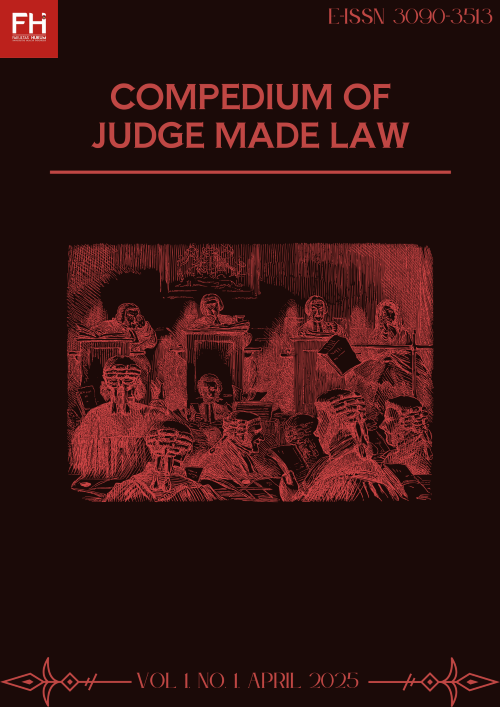Reverse Proof System In Gratification In Criminal Acts Of Corruption
DOI:
https://doi.org/10.56087/tjkj2952Keywords:
pembuktian terbalik, gratifikasi, tindak pidana korupsiAbstract
This study aims to examine the application of the reversal of the burden of proof in gratification-related corruption cases, using Decision No. 45/Pid.Sus-TPK/2021/PN Mks as a case study. In the context of Indonesian law, the reversal of the burden of proof is a legal mechanism that enables defendants to demonstrate that the gratuities received are not connected to acts of corruption. This research adopts a normative juridical method combined with a case study approach to analyze how judges interpret and implement the reversal of proof provisions as stipulated in Law No. 31 of 1999 in conjunction with Law No. 20 of 2001 on the Eradication of Corruption. The findings indicate that the panel of judges concluded the defendant failed to prove that the received gratuities were unrelated to their official position or authority. Consequently, the reversed burden of proof did not exonerate the defendant from legal accountability. These results highlight the inherent challenges defendants face in fulfilling the evidentiary burden and underscore the necessity for a comprehensive understanding of both substantive and procedural aspects of law in the application of reversed proof mechanisms. This research is expected to contribute to the development of criminal procedural law, particularly in corruption cases in Indonesia.
References
[1] H. Siallagan, “Penerapan Prinsip Negara Hukum Di Indonesia,” Sosiohumaniora, vol. 18, no. 2, pp. 131–137, 2016, doi: 10.24198/sosiohumaniora.v18i2.9947.
[2] A. S. Noor Said, “Tindak Pidana Korupsi Sebagai Kejahatan Luar Biasa,” JUSTITIA J. Ilmu Huk. dan Hum., vol. 8, no. 1, p. 18, 2025, doi: 10.31604/justitia.v8i1.18-23.
[3] G. C. Kirana, “Pembuktian Gratifikasi Dalam Tindak Pidana Korupsi,” Huk. Pidana dan Pembang. Huk., vol. 1, no. 1, 2018, doi: 10.25105/hpph.v1i1.3574.
[4] H. Prihastuti, “Gratifikasi Seksual Sebagai Bentuk Tindak Pidana Korupsi Dalam Perspektif Undang-Undang Pemberantasan Tindak Pidana Korupsi,” 2022.
[5] D. T. Aripianto, “Kedudukan Asas Pembuktian Terbalik Dalam Perkara Tindak Pidana Gratifikasi,” Negara dan Keadilan, vol. 11, pp. 202–214, 2022, [Online]. Available: https://riset.unisma.ac.id/index.php/negkea/article/view/18652%0Ahttps://riset.unisma.ac.id/index.php/negkea/article/download/18652/14185
[6] A. C. Cindrapole and S. Rosmini, “the Legal and Ethical Implications of Surveillance in Criminal Law : a Literatur Review,” vol. 4, no. 1, pp. 448–455, 2024.
[7] D. Andika, “Andika, Djohan. "Analisis Yuridis Potensi Asset Recovery Menggunakan Undang-Undang Nomor 8 Tahun 2010 Tentang Tindak Pidana Pencucian Uang (Studi Kasus Penanganan Tppu Polresta Surakarta Tahun 2021),” 2022.
[8] D. Haspada, “Tantangan Dan Solusi: Mengatasi Lemahnya Penegakan Hukum Di Indonesia,” vol. 5, no. 2, pp. 799–811, 2023.
[9] A. Rahman, “Rekonstruksi Regulasi Pertanggungjawaban Pidana Komisaris Perseroan Yang Melakukan Tindak Pidana Korupsi Berbasis Nilai Keadilan,” Accid. Anal. Prev., vol. 183, no. 2, pp. 153–164, 2023.
[10] W. Prasetyo, “Rekonstruksi Regulasi Pengembalian Kerugian Negara Pada Tindak Pidana Korupsi Melalui Kebijakan Mediasi Penal Yang Berbasis Keadilan Pancasila,” 2024.
[11] L. A. Sari, “Peringanan Hukuman Tindak Pidana Korupsi dalam Perma No. 1 Tahun 2020 Perspektif Maqāṣid Asy-syarī’ah Jasser Auda,” UII Repos., no. 1, 2025, [Online]. Available: https://dspace.uii.ac.id/handle/123456789/55471
[12] S. Lasmadi and E. Sudarti, “Pembuktian Terbalik Pada Tindak Pidana Pencucian Uang,” Refleks. Huk. J. Ilmu Huk., vol. 5, no. 2, pp. 199–218, 2021, doi: 10.24246/jrh.2021.v5.i2.p199-218.
[13] M. Hatta and D. T. Yudi Afrizal, “Ratio Legis Penerapan Beban Pembuktian Terbalik Di Indonesia (Komparasi Hukum Pidana Indonesia Dan Hukum Pidana Islam),” Istinbath J. Huk., vol. 18, pp. 76–103, 2021, [Online]. Available: http://e-journal.metrouniv.ac.id/index.php/istinbath/index
[14] M. R. Adiwijana, “Pembebanan Pembuktian dalam Tindak Pidana Pencucian Uang,” Media Iuris, vol. 3, no. 1, p. 75, 2020, doi: 10.20473/mi.v3i1.18416.
[15] A. Baene, “Penerapan Hukum Pidana pada Tindak Pidana Gratifikasi yang Dilakukan dalam Jabatan,” J. Panah Keadilan, vol. 1, no. 2, p. 5, 2022, [Online]. Available: https://jurnal.uniraya.ac.id/index.php/PanahKeadilan/article/view/448/374
Downloads
Published
Issue
Section
License
Copyright (c) 2025 Muh Rifaldy Palorongi Hamid, Nurul Qamar, Hardianto Djanggih

This work is licensed under a Creative Commons Attribution-ShareAlike 4.0 International License.


